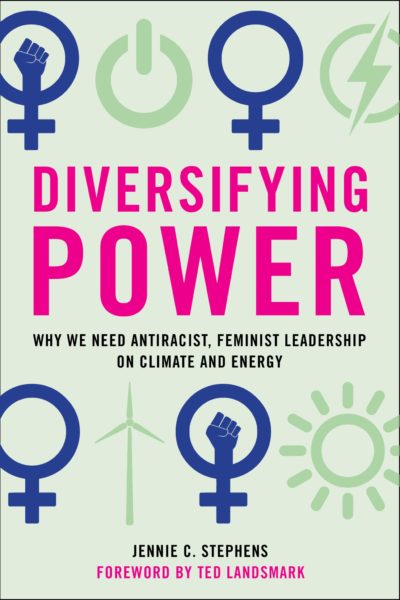“Diversity matters in climate and energy policy because for too long, concerns of vulnerable communities have been minimized and dismissed while white-male-dominated-fossil-fuel interests have profited from exploiting marginalized people. “– Jennie C. Stephens
Geoff Holland – Your book, Diversifying Power points out that women and people of color have traditionally been excluded from the cultural levers of power. Why is gender-equal, anti-racist diversity so important in shaping effective energy and climate policy?
Jennie C. Stephens – Diversity matters in climate and energy policy because for too long, concerns of vulnerable communities have been minimized and dismissed while white-male-dominated-fossil-fuel interests have profited from exploiting marginalized people. Without diverse leadership, the United States has invested in concentrating wealth and power by supporting the “polluter elite” rather than investing in the basic needs of people and communities. Research shows us that when women, people of color, and indigenous folks show up in leadership spaces where they have been historically excluded, they bring with them different lived experiences and different perceptions of risk that lead to more socially just outcomes. Research also shows that more diverse teams, more diverse organizations, and more diverse sectors are more innovative. For the transformative changes that are needed to effectively respond to the climate crisis and equitable transition to a renewable-based future, diverse leadership is essential.
GH – Since the beginnings of agriculture, the course of history has been driven by men making the rules, women being subjugated, and nature being plundered relentlessly. What is the evidence that this kind of thinking no longer works?
JS – We are facing unprecedented, interconnected crises because of traditional male-dominated systems. All too often the climate crisis is framed as an isolated scientific problem that requires a technological fix. With this framing, social justice, social change, and institutional innovation are usually ignored – and then the challenge seems distant to most people.
I coined the term “climate isolationism” to characterize this common but unproductive framing of climate change as a narrow, isolated, discrete, scientific problem in need of technological solutions. Decision-makers working within a lens of climate isolationism often focus quantitatively on carbon reductions, greenhouse gas inventories, and carbon pricing, while inadvertently dismissing the human dimensions associated with these quantitative measures. This technocratic focus limits public engagement and excludes people because the language and approach only resonate with a small subgroup of society.
GH – Have we reached the end of the road with male cultural dominance?
JS – No – plenty of people are trying to reinforce it even more.
GH – You talk about the need to practice feminist, anti-racist leadership. Why is that important?
JS – Antiracist, feminist leadership involves constantly acknowledging and resisting the problematic power dynamics associated with conventional patriarchal systems, practices, and policies that privilege men and whiteness. Antiracist, feminist leadership focuses on collaborative and inclusive approaches to distributing wealth and power and prioritizing investments in communities, workers’ rights, and public health. Anyone – including people of any racial or gender identity, any sexual orientation, and any cultural and religious backgrounds – can practice antiracist, feminist leadership. Climate and energy leaders who embrace antiracist and feminist principles are actively resisting the concentration of wealth and power and fossil fuel interests that have been strategically working for decades to prevent a transition to a renewable-based society. Antiracist, feminist leadership involves connecting climate and energy investments to jobs and economic justice, health and food, housing justice, transit equity, and education.
GH – How is biomimicry reflected in the emergence of clean, green inexhaustive sources of energy like wind and solar, along with green hydrogen as a clean, storable energy commodity?
Renewable energy is abundant, perpetual and free, and relies on natural processes, patterns, and cycles of earth’s systems – just like biomimicry does.
GH – Is green energy a natural fit with feminist, anti-racist public policy?
JS – Feminist, anti-racist policies resist the concentration of wealth and power that has been supported by the extractive and exploitative fossil fuel industry.
GH – Many of the world’s vexing, existential threats are linked, and the best way forward is to address them together. Can you elaborate on what those challenges are, and why addressing them collectively is the best way forward?
JS – It is increasingly clear that incremental steps and small tweaks to the status quo are insufficient. Therefore, we need bold and ambitious leaders who are committed to ending fossil fuel reliance by prioritizing economic justice and by investing in the universality of human rights and a future that offers dignity for all. To achieve these broad systemic changes, we need diverse leadership to better represent the needs and interests of the families and communities that are disproportionately affected and most vulnerable to climate disruptions.
GH – Can you talk about the failure of ‘climate Isolationism’, and why the answer to that narrow thinking is ‘energy democracy’?
JS – Energy democracy is an alternative way to frame our response to the climate crisis as an opportunity for investing in communities and redistributing power literally and figuratively. Energy democracy is a growing social movement that resists the concentrated power and influence of fossil fuel energy companies and recognizes that ownership of energy resources and more equitable distribution of profits from renewable energy infrastructure would redistribute political and economic power. The social changes resulting from investments in a new distributed renewable economy have huge potential to be politically and economically transformative. Investing in a future powered by renewables including wind (both onshore and offshore), solar power (utility-scale, household-scale, and community solar), as well as geothermal and maybe micro-hydro, wave, and tidal – allows more people, communities, and organizations to benefit and be involved – and could bring widespread benefits by allowing for local and community-owned energy.
GH – In your book, you talk about ‘Growing the Squad’. What does that mean and is it a crucial catalyst for green energy democracy?
The four non-white Congresswomen known as the ‘Squad’ have radically changed climate discourse and climate policy in the United States because they link climate action with jobs and economic justice, equitable access to healthcare, food, housing, and transportation. Congresswoman Ayanna Pressley (D-MA), has said: “Anyone who is interested in building a more equitable and just world is a part of the Squad”.
GH – How important is the role of the individual citizen in solving the climate crisis with clean, inexhaustible green energy?
We need systemic transformational change, so we need more than individual action. Collective action requires individuals to collaborate and coordinate their efforts to multiply the impact of their efforts by acting in solidarity with others.
 Jennie C. Stephens is Director of the School of Public Policy and Urban Affairs, and the Dean’s Professor of Sustainable Science and Policy at Northeastern University. She is the author of Diversifying Power: Why We Need Anti-racist, Feminist Leadership on Climate and Energy (Island Press, 2020)
Jennie C. Stephens is Director of the School of Public Policy and Urban Affairs, and the Dean’s Professor of Sustainable Science and Policy at Northeastern University. She is the author of Diversifying Power: Why We Need Anti-racist, Feminist Leadership on Climate and Energy (Island Press, 2020)
The MAHB Blog is a venture of the Millennium Alliance for Humanity and the Biosphere. Questions should be directed to joan@mahbonline.org
The views and opinions expressed through the MAHB Website are those of the contributing authors and do not necessarily reflect an official position of the MAHB. The MAHB aims to share a range of perspectives and welcomes the discussions that they prompt.

